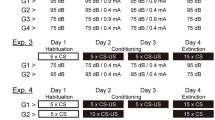Abstract
The course of adaptation to familiar environments was measured with a resident-intruder paradigm in which length of prior adaptation was varied and the outcome of male albino rats’ competitive, homosexual mounting encounters was observed. The percentage of total mounts in which the resident was the mounter varied directly with the duration of the resident’s prior adaptation, reaching 90% after 3 min. Longer adaptation periods did not increase this percentage significantly. Removal from an environment for up to 3 min. did not reduce the resident’s mounting dominance in that environment nor did the presence of another animal alter the course of adaptation. Odor associated with straw bedding was the primary sensory cue used by rats to distinguish different environments. The generality of the resident-intruder method was discussed.
Similar content being viewed by others
References
ALLEN, J. A., & BOICE, R. 1971. Effects of rearing on homosexual behavior in the male laboratory rat. Psychonomic Science, 23, 321–322.
BARNETT, S. A. & STODDART, R. C. 1969. Effects of breeding in captivity on conflict among wild rats. Journal Of Mammalogy, 50, 321–325.
BEACH, F. A. 1942. Analysis of the stimuli adequate to elicit mating behavior in the sexually inexperienced male rat. Journal of Comparative and Psysiological Psychology, 33, 163–207.
BEACH, F. A. 1947. Evolutionary changes in the physiological control of mating behavior in mammals. Psychological Review, 54, 297–315.
BEACH, F. A., & HOLZ, A. M. 1946. Mating behavior in male rats castrated at various ages and injected with androgen. Journal of Experimental Zoology, 101, 91–142.
GERALL, A. A., HENDRICKS, S. E., JOHNSON, L. L., & BOUNDS, T. W. 1967. Effects of early castration in male rats on adult sexual behavior. Journal of Comparative and Physiological Psychology, 64, 206–212.
HARDY, D. F., & DEBOLD, J. F. 1972. Effects of coital stimulation upon behavior of the female rat. Journal of Comparative and Physiological Psychology, 78, 400–408.
KAUFMANN, J. H. 1971. Is territoriality definable? In A. H. Esser (Ed.), Behavior and environment. The use of space by animals and men. New York: Plenum Press. Pp. 36–40.
LARSSON, K. 1969. Failure of gonadal and gonadotrophic hormones to compensate for an impaired sexual function in anosmic male rats. Physiology and Behavior, 4, 733–737.
LARSSON, K., & ESSBERG, L. 1962. Effect of age on the sexual behavior of the male rat. Gerontologia, 6, 133–143.
SIEGEL, S. 1956. Nonparametric statistics. New York: McGraw-Hill.
SPIGEL, I. M., TRIVETT, S., & FRASER, D. 1972. Grooming behavior and competitive dominance in the albino rat. Journal of Comparative and Physiological Psychology, 78, 409–411.
STEWART, J., & KACZENDER-HENRIK, E. 1971. Male copulatory behavior in the male rat after perinatal treatment with antiandrogenic steroid. Hormones and Behavior, 2, 255–264.
UYENO, E. T., & WHITE, M. 1967. Social isolation and dominance behavior. Journal of Comparative and Physiological Psychology, 63, 157–159.
WARD, I. L., & GERALL, A. A. 1968. Dominance behavior in socially isolated rats. Psychonomic Science, 13, 39–40.
Author information
Authors and Affiliations
Additional information
This research was supported by NIH Grant HD 00867-9, National Institute of Child Health and Human Development, USPHS, directed by Arnold A. Gerall.
Rights and permissions
About this article
Cite this article
Thomas, T.R. Use of a Resident-Intruder Paradigm to Measure the Influence of Environmental Adaptation on Mounting Behavior. Psychol Rec 23, 405–416 (1973). https://doi.org/10.1007/BF03394185
Published:
Issue Date:
DOI: https://doi.org/10.1007/BF03394185




